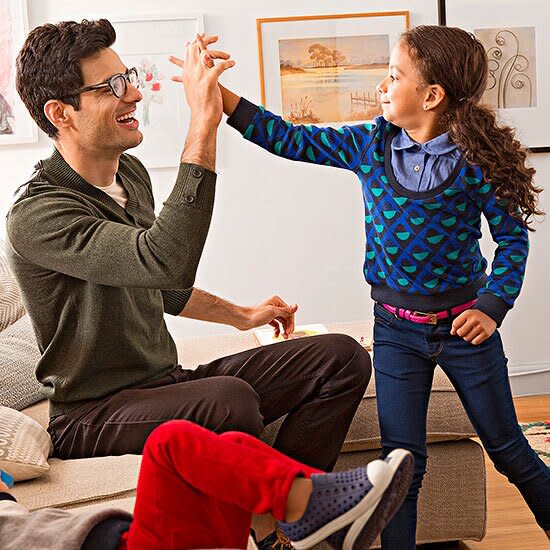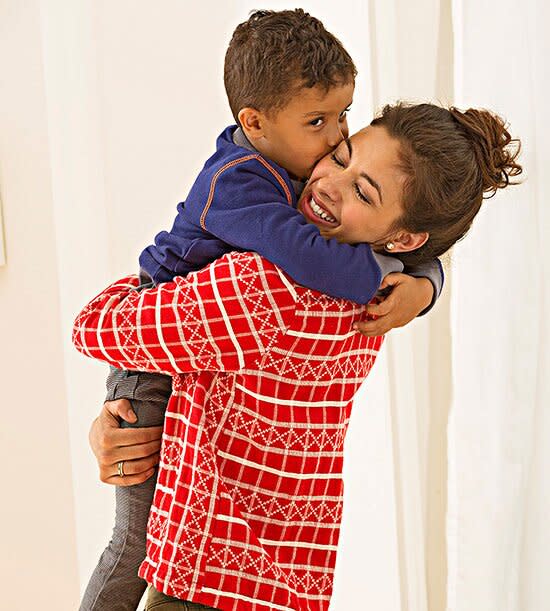6 Ways to Raise a Grateful Child

Grace Huang
Guilt was a powerful appetite stimulant during my childhood. I have vivid memories of sitting at our kitchen table, vegetables untouched, and hearing my mother say, "Clean your plate. There are kids starving in China." When I became a parent, I vowed not to use guilt to teach our kids to be grateful for the food on their plate. Or, for that matter, for the clothes in their closet. However, we all have our low moments.
My daughter was 7 and having a wardrobe meltdown. Nothing she tried on was right, and the other girls all had cuter clothes. Everyone would laugh at her if she wore that outfit again. It happened to be bad timing for me: I'd had a particularly stressful period at work at Children's Hospital Colorado, where my patients and their families were experiencing true life crises. So on that day, I reached my breaking point with her sooner than I normally would have.
"Which is your favorite shirt?" I asked her. Then I took that shirt and my daughter's hand, and led her to the car. We drove to a nearby Goodwill store and I pulled up to the donation station. "This is the place to give clothes to little girls who are less fortunate than you and who would be thrilled to have the clothes in your closet," I said. We got out of the car and I made my baby give away her favorite shirt to the nice Goodwill man at the curb, despite the fact that she was sobbing.
I immediately regretted how I'd handled the situation, and I am still haunted by that memory. Years ago, my daughter promised that she'd forgiven me -- and she has blossomed into a truly appreciative and giving young adult (my bias acknowledged). But ever since that infamous "Shirt Affair," I've been on a quest to find less draconian parenting strategies that can help children develop gratitude. There will always be people who have more than we do, and always people who have less. How can we teach our kids to be grateful rather than envious, generous rather than selfish, satisfied rather than needy?
We know the predictable milestones of childhood -- a baby progresses from rolling over to crawling, to standing, and finally to walking. From babbling to first words, to full sentences, to adolescent back talk. But unlike other physical and behavioral development, a child's gratefulness -- appreciating what he has -- actually seems to regress as he gets older. Infants need only cuddling, rocking, a clean diaper, milk, loving smiles, and perhaps a colorful rattle in order to be content. Older babies take delight in each stair they climb on their own, or in a game of peekaboo, and are often more excited by the gift box and wrapping paper than by the toy inside.
However, toddlers demand more than the simple pleasures of life, and they naturally begin to demonstrate their independence ("I do it myself!"), defiance ("No!"), and possessiveness ("Mine!"). And just as they are asserting themselves and testing their power to persuade, their exposure to product marketing soars -- so that their age-appropriate self-centeredness evolves into needing more and appreciating less. I remember one Sunday morning when our kids were little and we put them in front of the TV so we could steal a few extra minutes of sleep. Before long, our youngest, then 2, came toddling into our room singing, "I want Froot Loops, I want Froot Loops!" We had never served Froot Loops in our house. Sure enough, his siblings confirmed that they had just watched a Froot Loops commercial. And so it started.
The American Academy of Pediatrics (AAP) estimates that a typical child may see thousands of ads every day, including those on television, the Internet, and billboards. Although the AAP discourages any screen time for kids under age 2, entertainment media isn't the only source of temptation. The check-out line at the supermarket positions candy and trinkets at children's eye level. And once they start school, kid-to-kid marketing makes children more aware of all the cool things that their friends have.
Fortunately, it's not inevitable that your kids will become needy and demanding -- nor is it irreversible if they're already headed down that road. These strategies will help you teach them to be thankful for the many blessings in their life.

Grace Huang
Be a Good Role Model
Your kids are always watching, listening, and learning from what you do and say. So express your own gratitude for what you have in life as part of your daily routine. You could weave in comments like these: "I'm exhausted because work was really hard today, but I'm so grateful to have a job so we can buy the things we need" or "Let's remember to tell Grandma how much we appreciate her coming to stay here this week while I'm out of town" or "Wow, can you believe that the car started even though it's so cold outside -- it would have been a really long walk home!"
Also look for low-key ways to remind your kids of the things they have to be thankful for in their lives, by saying things like, "Aren't we lucky to have our warm beds?" or "It's so wonderful to put on clean clothes each morning" or "You were so little when you got this toy and it's still so much fun to play with!" My wife's grandmother was legendary for frequently telling her three young daughters, "Remember, kids, you're having a happy childhood."
Encourage Personal and Social Responsibility
Expecting your child to put his toys away after playing prevents them from getting stepped on and broken, but it also helps him focus on the worth of what he already has. Giving to charity or doing volunteer work teaches kids about those who are less fortunate and that we all share responsibility for each other. Try any of these with your kids: Prepare food bags for homeless people you pass on the street; serve a meal at a shelter; pack goody boxes with personal thank-you notes for soldiers abroad; donate used toys and clothing; participate in a charity walk; help an elderly neighbor with her chores; visit nursing-home residents. Experiencing the gratitude that others feel for their small acts of kindness makes a lasting impression on kids.
Do your part to help protect the environment by walking or biking rather than driving short distances, and conserve water and energy. Visit a dump site to remind your kids of the effects of wastefulness. Recycling and composting teach kids that even "trash" and "garbage" have value and can someday be used again. Helping children recognize the resources they depend on may also make them think twice before leaving the lights on when they leave their room.
Look at the Big Picture
It's important for kids to understand their life within a greater global context. The freedoms, opportunities, and relative safety and security of our country and communities stand in stark contrast to much of the planet. Only when kids are aware of the larger world around them will they best appreciate their own little part of it. Introduce your child to age-appropriate sources of information, such as National Geographic Kids.
Consider Sponsoring a Child in Need
A variety of well-established charitable organizations, such as ChildFund International and Save the Children, offer a chance to form a personal bond with a child who lives in Africa, Asia, or Latin America. For a modest monthly donation, which your kids can help contribute to (with a portion of their allowance or lemonade-stand proceeds), your family will receive photos, updates, and letters from the child you are helping.
Create a Special Place
Help your kids design a box or a shelf to hold the possessions that mean the most to them: a vacation souvenir, a beautiful rock or seashell, a charm bracelet, an autographed baseball, a pet's picture. The spot should be relatively small, so only the most precious objects can fit. Setting aside limited space for objects of special significance helps kids remember to appreciate the little things that add up to happiness. If your child asks you to buy her something when you're out shopping, you could ask, "Is that toy important enough to you that you would take something out of your special box to make room for it?"
Say Thanks Year-Round
Indeed, it takes a village to raise a child, and many of the people in our life deserve gratitude. Help your children bake and deliver cookies to the local fire or police station; Skype with grandparents and cousins who live far away; wave to the mail carrier, garbage collector, and street cleaner as they pass your house; give the coach (and the referee!) a high five and a loud "Thanks" after each game. In fact, why limit Thanksgiving to once a year? You could designate a "Thursday thank-you dinner" once a month to repeat the most important part of the holiday. Turkey and stuffing aren't required -- only a special conversation about everything that your family has to be grateful for.
Don't forget to thank your children when they do whatever you've asked, and especially when they do something nice for someone else. Interestingly, research has shown that choosing the right words can help encourage your child to want to do good. One recent study of 3- to 6-year-olds in Child Development found that using a noun ("You can be my helper") motivates kids more than using a verb ("You can help") because nouns (such as helper or sharer) appeal to a child's positive sense of identity.
As parents, it's natural to feel sometimes like we are perpetual givers, our children are perpetual takers, and no matter how much we give and how much they take, it's never going to be enough for them. At those times, try to remember that egocentricity and selfishness are perfectly normal developmental stages of childhood. How we handle those stages will determine what kind of people our kids grow up to be.
